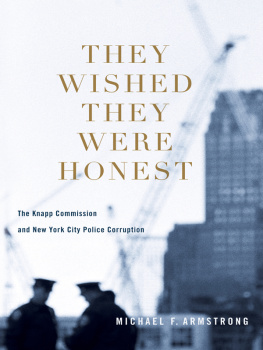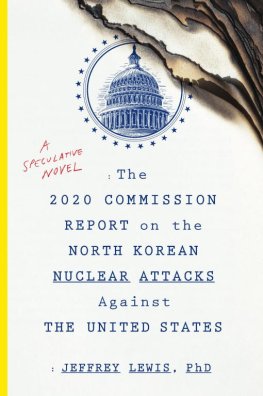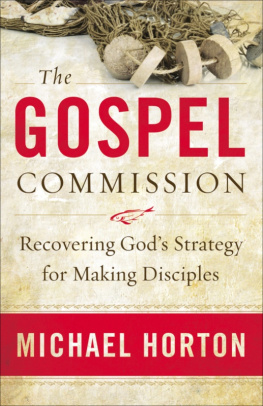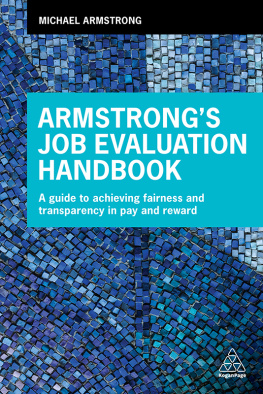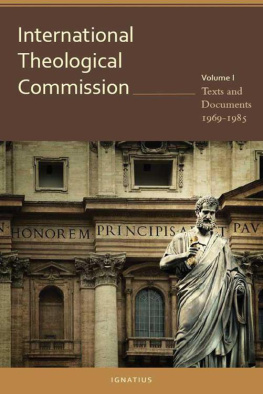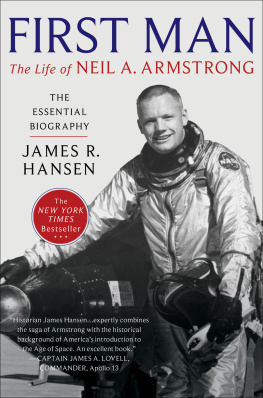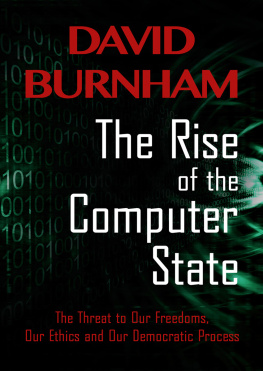THEY WISHED THEY WERE HONEST
THEY
WISHED
THEY
WERE
HONEST
THE KNAPP COMMISSION AND NEW YORK CITY POLICE CORRUPTION
MICHAEL F. ARMSTRONG
COLUMBIA UNIVERSITY PRESS
NEW YORK
Columbia University Press
Publishers Since 1893
New York Chichester, West Sussex
cup.columbia.edu
Copyright 2012 Michael F. Armstrong
All rights reserved
E-ISBN 978-0-231-52698-2
Library of Congress Cataloging-in-Publication Data
Armstrong, Michael F., 1932
They wished they were honest : the Knapp Commission and New York City police corruption/Michael F. Armstrong.
p. cm.
Includes index.
ISBN 978-0-231-15354-6 (cloth : alk. paper)ISBN 978-0-231-52698-2 (ebook)
1. New York (N.Y.). Knapp Commission. 2. Police corruptionNew York (State)New York 3. Governmental investigationsNew York (State)New York. I. Title.
HV8148.N52A76 2012
364.1'3230883632097471dc23
2011044777
A Columbia University Press E-book.
CUP would be pleased to hear about your reading experience with this e-book at .
CONTENTS
Ten percent of the cops in New York City are absolutely corrupt, ten percent are absolutely honest, and the other eighty percentthey wish they were honest.
Frank Serpico, New York City police officer, 19591972
They were known as New Yorks Finest. And they were. Tough, streetwise, underpaid, braveoften heroicthe police officers in New York City in 1970 rightly viewed themselves as an unappreciated bulwark against crime.
They were alsoalmost all of themcorrupt.
Without compromising or contradicting the valiant aspect of police work, another simultaneous reality existed in the New York City Police Department: corruption had become a way of life. Any kid on any corner in Harlem could report seeing police officers being paid off by gamblers. Bars and nightclubs on the Upper East Side and in Greenwich Village flagrantly violated a score of easily enforced regulations. Drivers tucked bills in wallets next to licenses that a cop might ask to see. On the darker side, organized crime figures seemed to operate without being bothered very much, and a narcotics trade, then in its adolescence, was maturing with only sporadic interference from the police.
It was said that corrupt cops were of two kinds: meat eaters, the incorrigible few, who devoted virtually full time to collecting payoffs and who committed or covered up really serious crimes; and grass eaters, the vast majority, who participated in the common, everyday graft indulged in as a significant sideline by just about everyone on the job. While some efforts had been made to catch the meat eaters, nothing was being done, systemically, about the grass eaters. That effort would have to involve cleaning up the swamp of low-level corruption in which the Department wallowed. This swamp provided the breeding ground for more significant police crime, and stifled the natural impulses of the vast majority of cops to do their jobs with integrity and pride. But no one in authority was willing to admit that the swamp existed, much less make any move to clean it up.
Spurred by a newspaper expos in 1970, the result of public accusations by a young hippie cop named Frank Serpico, the citys youthfully charismatic mayor, John V. Lindsay, appointed a commission to investigate corruption in the police department. The commission, which came to be known as the Knapp Commission, after its chairman, Whitman Knapp, conducted a yearlong investigation.
Underfunded and unfamiliar with the ways of the organization it was charged with investigating, the commissions somewhat quixotic goal was to uncover definitive proof of the extent of graft among 32,000 police officers, and bring that proof to public attention. Was police corruption a matter of a few rotten apples in an otherwise pure barrel, as police brass and protective politicians routinely proclaimed, or was the disease spread throughout the whole barrel? If, as hearsay accounts indicated, widespread graft existed but was tolerated by higher-ups and public officials who chose to look the other way, public exposure of actual conditions could be the first step on the road to reform. Specific evidence presented in high-visibility public hearings could create pressure on the powers-that-be to focus attention on conditions in the whole barrel, instead of scapegoating a few rotten apples. But first the commission had to come up with evidence.
Any hope of finding the needed proof rested heavily on being able to persuade or pressure corrupt police officers to describe, firsthand, the graft in which most cops participated and about which all were aware. Prospects of success in this effort seemed remote. Everyone knew that cops dont talk.
These are my recollections, as the Knapp Commissions chief counsel, of its struggles to pierce the legendary blue wall of silence and bring to public view serious conditions of corruption in the New York City Police Department.
In the immediate aftermath of the Knapp Commissions efforts, I was besieged by requests to write a book. My consistent answer was There already is a bookits called The Knapp Commission Report. I felt that behind-the-scenes tales of the Commissions work should not distract attention from its official findings. Now, almost forty years later, the name of the Knapp Commission is no longer on everyones lips, nor indeed in most peoples memories. It has settled, quietly, into its proper place in history, whatever that may be. So I think it can no longer do any harm to recount the human side of the making of that history. Also, a fuller understanding of the events of 197072 may be of help in maintaining the vigilance that is required to prevent a resumption of the cycle that has seen New York beset by a police corruption scandal every twenty years since the late nineteenth century.
Most of what I have set forth was committed to writing, in some form, fairly soon after the events occurred. In putting it all together, I have done my best to be accurate, the only minor exceptions being the few occasions when I have, for one reason or another, substituted pseudonyms for real names. My memories have been compared against those of others who participated and, where possible, confirmed by tape transcripts, documents, and the public record. In instances where nothing but memories remain, I have sometimes acquiesced to the recollections of others but, adopted or otherwise, the memories are my own.
On April 25, 1970, New Yorkers awoke to a news story on the front page of the New York Times that was to keep many people awake for a long time. Written by thirty-seven-year-old investigative reporter David Burnham, the article accused the New York City Police Department of being laced with corruption. It suggested that Mayor John Lindsay, a tall, handsome patrician with an eye on the White House, had deliberately ignored the problem.
Burnhams article was based chiefly on the experiences of a young police officer named Frank Serpico. To most of the cops who knew him, Serpico was a hippie if not an outright weirdo. His beard, longish hair, and Greenwich Village clothes were enough to mark him as strange in a department with a solid tradition of conformity to values and styles that long predated the 60s. Serpicos tendency not to conform became a serious liability when, after five years on the force, he was transferred to the plainclothes division. There, conformity meant considerably more than dressing or talking like your comrades: you also made money the way they didfrom graft.
Of the 32,000 men and women in the Department, about 450 were plainclothesmen, charged with enforcing the laws against vice, particularly gambling. These were officers from the patrol force working out of uniform. Detectives were something else. They also worked in plain clothes, but they carried gold rather than silver badges, performed investigative as opposed to patrol duties, and served in their own three-thousand-man Detective Division. A heavy concentration of plainclothesmen were assigned to squads in the citys black and Hispanic ghetto neighborhoods, where gambling was heaviest and where the numbers racket was as well-organized as the New York City Police Departmentmaybe better. Each day, millions of ghetto dwellers gave anywhere from twenty-five cents to a dollar or two to neighborhood runners in the hopes of picking the right three-digit number established daily by a set formula based on published local racetrack betting results. Runners reported to their own local banks, which in turn reported to established organized crime figures located chiefly in Italian East Harlem. The whole operation was about as secret as the news on the front page of a New York tabloid. Other forms of gambling, like racetrack and sports book-making, which the plainclothes division was also supposed to control, operated almost as openly.

